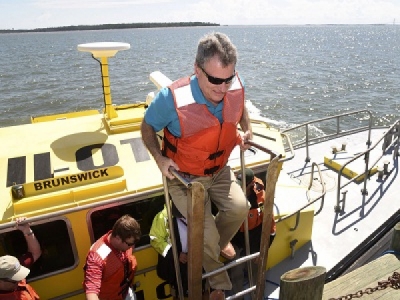
Posted on August 15, 2016
By Larry Hobbs, The Brunswick News
There is no shortage of wood pellets or grain at the Port of Brunswick, but many ocean-bound tankers often leave these shores with less than a full load.
It is done out of navigational necessity, the lighter load allows ships to ride high enough in the water to clear the channel. Likewise, incoming and outgoing Ro-Ro freighter traffic at the port sometimes must wait on high tide to clear the channel.
That is why U.S. Rep. Buddy Carter, R-1, says it is of vital importance that the channel be dredged to its proper depth this coming winter when the short window of opportunity to do so opens up. Carter took a tour of the port and the channel that serves it Wednesday, getting a first-hand assessment as plans are readied to dredge the channel next January and February.
He left from Colonel’s Island at the port aboard a Ro-Ro ship, the huge freighters packed with automobiles that “roll on” and “roll off” at each port. Some 12 miles out, Carter hitched a ride back in with a Brunswick harbor pilot.
The Port of Brunswick is the third largest Ro-Ro port in America and second nationwide in foreign Ro-Ro traffic. Bulk cargo traffic from the port’s Mayor’s Point Terminal stays busy shipping grain and woods pellets, which are used to fuel European power plants.
“Today was a great experience,” Carter said afterward. “It was certainly an eye-opening opportunity, to see the economic benefits we reap from that port. It gave me a great opportunity to see what the bar pilots are up against and just how important it is that we keep that channel dredged.”
The federally authorized operating depth for the channel is 38 feet at low tide in open water, and 36 feet at low tide on inland waters within the St. Simons Sound, said Billy Birdwell, spokesman for the U.S. Army Corps of Engineers in Savannah. Because of shoaling that fills in the waterway’s bottom with sand, the channel is generally more shallow than those standards, which are authorized by Congress. Pilots have reported it as shallow as 30 feet at low tide in some places. The channel was last measured at the proper authorized navigational depths in 2010, Birdwell said.
The Corps was in the midst of a dredging project this past winter when an emergency at the mouth of the Mississippi River forced it to cancel the project. The suction hopper dredging barge being used at the port had to be reassigned to an emergency project to clear sediment that had gathered at the mouth of the river due to heavy rainfall in Louisiana.
“Last year we were able to get down to 37 feet on the outer harbo r channel, but we had to pull the dredger off of that project because the mouth of the Mississippi was in desperate need,” Birdwell said. “It was all hands on deck.”
Because of turtle nesting season, dredging on Georgia’s coast can take place only during the chilly winter months when waters are below 55 degrees. That generally provides about two months each year to dredge, Birdwell said. The corps plans to dredge again this winter and will accomplish as much as possible within that short time frame, he said.
“We’re gearing up to come back when the season opens and be ready to go to work on it again,” Birdwell said.
Carter said it is important that Congress provides the money needed to perform the work when the time comes. The U.S. House of Representatives approved $5.8 million for work on the channel in 2015, and have earmarked another $4.5 million for fiscal year 2017, said Nick Schemmel, an aide in Carter’s office. The Georgia Ports Authority typically allocates about $3 million annually, but has not yet determined how much it will contribute in fiscal year 2017, Schemmel said.
Fees collected from traffic into the Port of Brunswick generate about $15 million annually toward the national Harbor Maintenance Trust Fund.
“I think anybody who goes out there and sees the logistics of the shipping business here will recognize just what an economic engine that port is for our area,” Carter said. “The commerce that goes through there, the number of jobs created there, and the ripple effect it has on the rest of our economy, the impacts are just tremendous.”
Source: The Brunswick News





